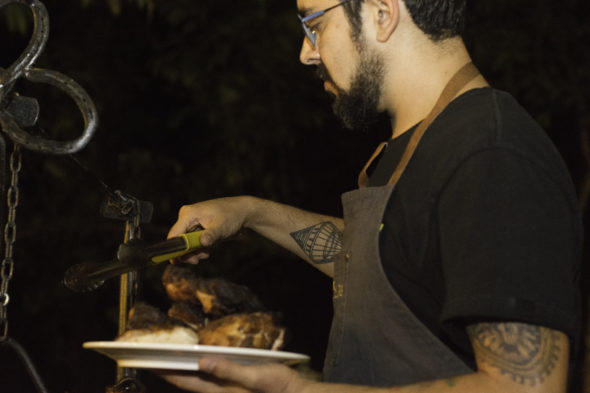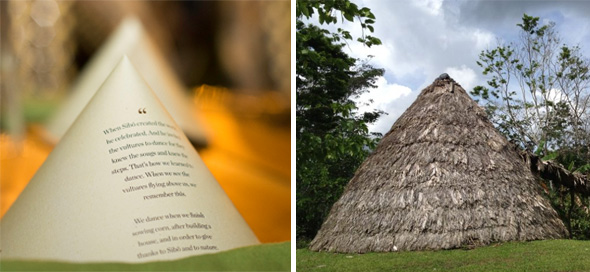The Harmony Event Series: Chef Pablo Bonilla

The Event
On Friday Feb 1, Costa Rican chef and researcher Pablo Bonilla prepared an intimate gastronomic experience at the Harmony Juice Bar. He created a tasting menu of 6 dishes inspired by his work with the Bribri of Costa Rica, with most ingredients being sourced from this indigenous community.
The tables for the evening were set with menus that resembled the traditional conical house structure that is the center of the Bribri spiritual practice, and a symbolic representation of the universe. It is believed that the highest level of this house is where Sibö, creator of the universe, resides with the vulture king.

“When Sibö created the world, he celebrated. And he invited the vultures to dance for they knew the songs and knew the steps. That’s how we learned to dance. When we see the vultures flying above us, we remember this. We dance when we finish sowing corn, after building a house, and in order to give thanks to Sibö and to nature.”
At the center of the evening’s dinner experience was a beautiful barbecue. Pork cooked in the open air as the first plates and their accompanying drink and wine pairings were served. The taste of the food itself sparked lively conversation, as did Pablo’s concept of marrying indigenous ingredients and ancient techniques into his contemporary cuisine.

The Menu
Cured fish in pejibaye vinegar and dakoshka (pejibaye dough) – paired with Chicha de pejibaye
———
Pujagua corn meatballs and smoked hearts of palm pate – paired with Chicheme of pujagua corn and ginger
———
Hearts of palm soup and purple and white ñame chips – paired with Sauvignon blanc
———
Gallos de arracache with chicasquil – paired with Pinot grigio
———
Smoked pork pozol – paired with Merlot
———
Smoked sweet plantain ice cream with cocoa nibs – paired with Rum collins

A little more about Pablo…
Pablo Bonilla started his career in 2000, and after a few years working for local restaurants in Costa Rica, he travelled abroad to improve his gastronomic skills in Spain and Mexico.
In 2013, he returned to the country and began his research on the culinary traditions of different indigenous communities in Costa Rica. This work made him discover a whole universe of techniques, ingredients, and knowledge that were never before documented.
Mixing his experience in contemporary cuisine with the knowledge he is still gathering from his research, Pablo opened Sikwa, the only restaurant in Costa Rica focused entirely on indigenous and ancestral cuisine, sourcing 85% of its ingredients from the communities. Sikwa was recently named by New Worlder as one of The Americas’ 20 Best New Restaurants in 2018.
A little more about the Bribri…
The Bribri are located mostly in the mountains and Caribbean coastal areas of Costa Rica and northern Panama. Often called “the hidden people” because they live in relative isolation, there are varying estimates of their population. This isolation, along with the resolve of some community members, has helped them maintain their language, traditions and culture in the face of encroaching modernity.
The Bribri society is structured by clans (groups of extended family). Clans are “matrilineal,” meaning that the clan of the mother determines the clan of the child. Women have a very important place in society since they are the only ones that can inherit land and prepare the sacred cacao. Roles like the shaman are reserved exclusively for men.
Known for living off the land, the Bribri are able to raise much of their own produce, medicine, and housing materials, and the people have developed an extensive bartering system. Tourism, as well as selling products like cacao, bananas, and plantains, provides cash income to purchase what they can’t grow themselves.
Pablo continues to work hand-in-hand with communities to create a supply chain between indigenous farming communities (whose products are 100% organic) and restaurants in San Jose. You can read a great write up about his restaurant in Perfil Magazine online.

photo credit Perfil




